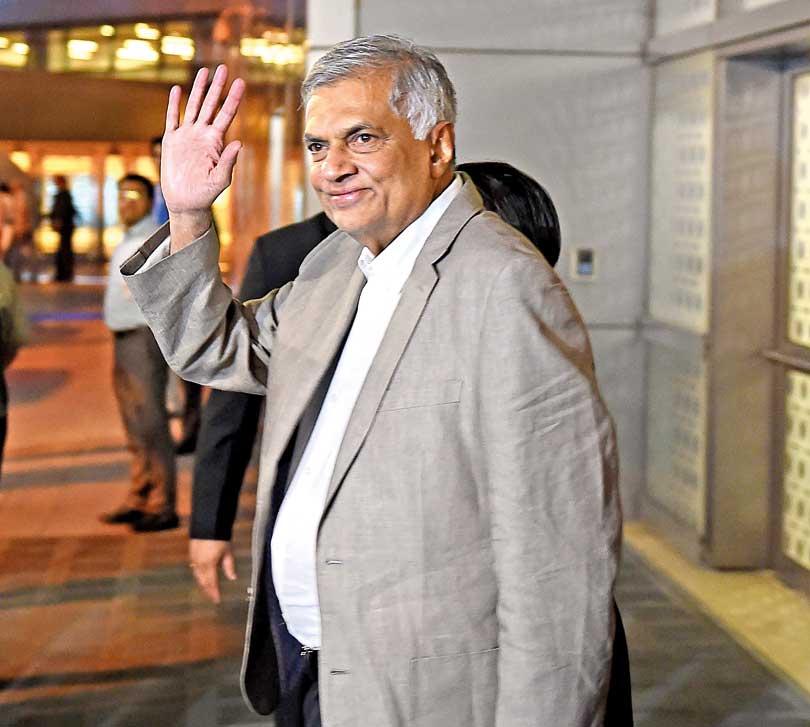Reply To:
Name - Reply Comment
Last Updated : 2024-04-20 00:00:00

 Whatever little information that emanated from the top level discussion among the senior leaders of the United National Party (UNP) on Tuesday suggested that there was, more or less, agreement to appoint party’s Deputy Leader Housing, Construction and Cultural Affairs Minister Sajith Premadasa as the presidential candidate.
Whatever little information that emanated from the top level discussion among the senior leaders of the United National Party (UNP) on Tuesday suggested that there was, more or less, agreement to appoint party’s Deputy Leader Housing, Construction and Cultural Affairs Minister Sajith Premadasa as the presidential candidate.
The office bearers of the UNP met at Temple Trees to discuss a way out of the crisis that has enveloped the party over. The tug-of-war between party leader Prime Minister Ranil Wickremesinghe and Sajith Premadasa locked the party in stalemate; leaving the presidential candidacy issue unresolved. The Elections Commission has declared November 16 as the day of polling. There is less than a fortnight for the prospective candidates to tender nominations for the elections. Nonetheless, the governing UNP is embroiled in its worst political crisis being unable to agree on its candidate. In the context, Tuesday’s party discussion was crucial. The party’s office bearers, loyal to both the Prime Minister and Minister Premadasa, took part in the discussion which was meant to break the gridlock and to get their act together ahead of the date of nomination.
After the meeting, information that leaked out from inner sources of the UNP indicated that there was general agreement to offer candidacy to Premadasa. It is correct. The Prime Minister consented to nominate him as the candidate, but made it conditional to a written assurance to implement a set of policies laid out by the party hierarchy. At the very beginning, Wickremesinghe spelled out that Premadasa should agree to scrap the Executive Presidency according to a time bound action plan upon if he wins. The Prime Minister proposed this  idea as a strategy to win over voters who would otherwise cast their ballots in favour of the Janatha Vimukthi Peramuna (JVP)-led which advocates doing away with the current presidential system. Next, he said a solution should be offered to settle the ‘Tamil national question’ enabling the UNP to woo constituents in the north and the east along with the formal backing of the Tamil National Alliance (TNA).
idea as a strategy to win over voters who would otherwise cast their ballots in favour of the Janatha Vimukthi Peramuna (JVP)-led which advocates doing away with the current presidential system. Next, he said a solution should be offered to settle the ‘Tamil national question’ enabling the UNP to woo constituents in the north and the east along with the formal backing of the Tamil National Alliance (TNA).
“Once we agree upon, we can present it to the Working Committee for approval,” he told Premadasa.
According to the proposed understanding, Wickremesinghe will continue to be the Prime Minister and the party leader. He will also be the candidate for premiership at the next parliamentary election.
Besides, Wickremesinghe’s faction has proposed a campaign management committee. It is expected to include Wickremesinghe, General Secretary Education Minister Akila Viraj Kariyawasam, Premadasa as the presidential candidate, Assistant Leader Ravi Karunanayake, party chairman Highways and Road Development Minister Kabir Hashim and possibly Public Administration Minister Ranjith Madduma Bandara. What’s intriguing is that Finance Minister Mangala Samaraweera has been excluded from this committee.
These conditions are undoubtedly tough for Premadasa who is advocating a different policy line. In his recent public address, he mostly appealed to populist sentiments. Abolition of the Executive Presidency is no longer popular or populist in today’s context in which constituents look to strong, stable central control to keep the country marching forward. The present government became unpopular with the masses in the south over its attempt to devolve power to the north and the east through the constitution making exercise. This exercise did not see the light of day due to the build-up of public opinion against it outside the north and the east. Premadasa is not keen to cash in solely on the minority communities to get them to vote for him en masse. He is not ready to compromise on votes in the south to appease the political parties representing the minority communities. So, it is hard to believe that he would accede to these conditions.
If Premadasa is agreeable to these conditions and becomes the candidate, his election campaign would have some contextual similarity to that of President Maithripala Sirisena who was elected on the plank of promise to prune executive powers in 2015. That strategy worked in that context in which all the forces were united against the incumbent administration. Today, the context is different, and as such the application of the same strategy is bound to fail.
With no clarity regarding a rival candidate as of yet, the SLPP campaign is not revving up. Instead, Rajapaksa travels the country and keeps engaging organizations representing people at different strata of society
However, proponents of candidacy to Premadasa believe that what is foremost is to secure nomination through consensual approach first. Once candidacy is secured, they think other matters become immaterial or secondary.
At Tuesday’s meeting, Minister Karunanayake who was opposed to Premadasa tooth and nail also tried to bargain for the post of finance minister with full authority under a future Government. He said there was injustice caused to him in this regard, and it should be corrected in the future.
Sri Lankan Podujana Peramuna (SLPP) which nominated former Defence Secretary Gotabaya Rajapaksa as its candidate is currently going ahead with electioneering. With no clarity regarding a rival candidate as of yet, the SLPP campaign is not revving up. Instead, Rajapaksa travels the country and keeps engaging organizations representing people at different strata of society. He outlines his policies and people’s support.
The SLPP is also having bilateral talks with Sri Lanka Podujana Peramuna (SLPP). Whatever the party decision is, the SLFP stalwarts will join hands with the SLPP ahead of the elections. This group of SLFPers who are planning to join the SLPP also includes Nimal Siripala de Silva and Ranjith Siyambalapitiya.
The SLPP is also being compelled to change or alter its campaign strategy in anticipation of Premadasa becoming the candidate of the UNP-led political force.

Add comment
Comments will be edited (grammar, spelling and slang) and authorized at the discretion of Daily Mirror online. The website also has the right not to publish selected comments.
Reply To:
Name - Reply Comment
On March 26, a couple arriving from Thailand was arrested with 88 live animal
According to villagers from Naula-Moragolla out of 105 families 80 can afford
Is the situation in Sri Lanka so grim that locals harbour hope that they coul
A recent post on social media revealed that three purple-faced langurs near t